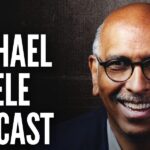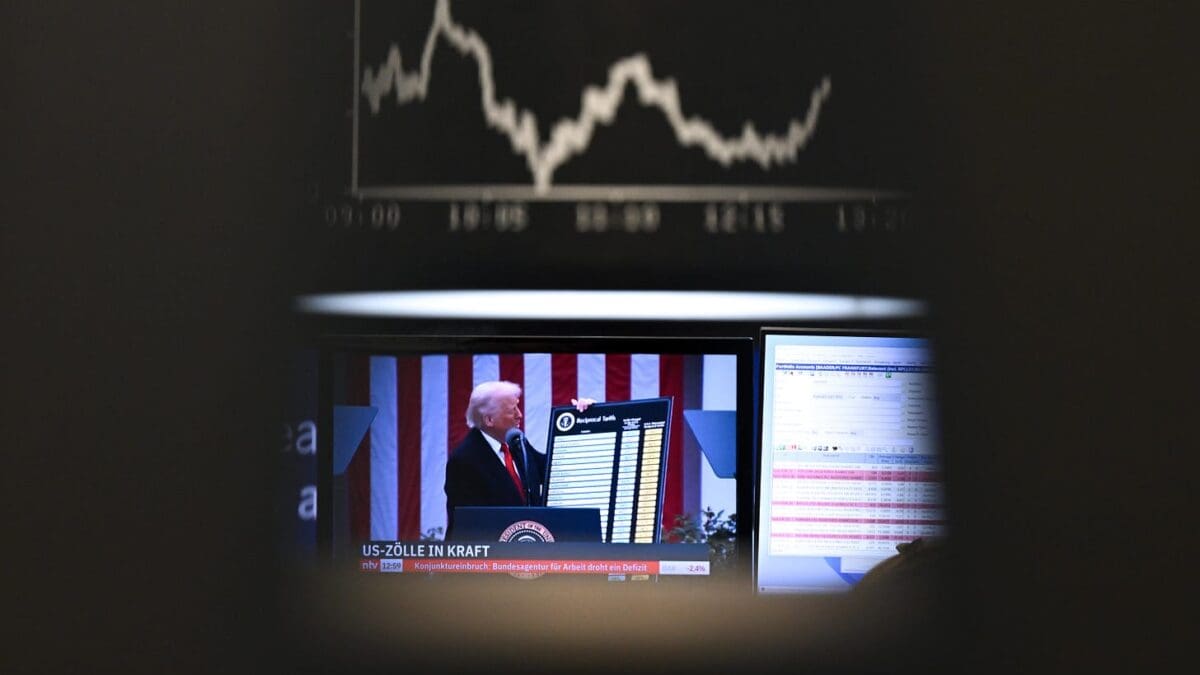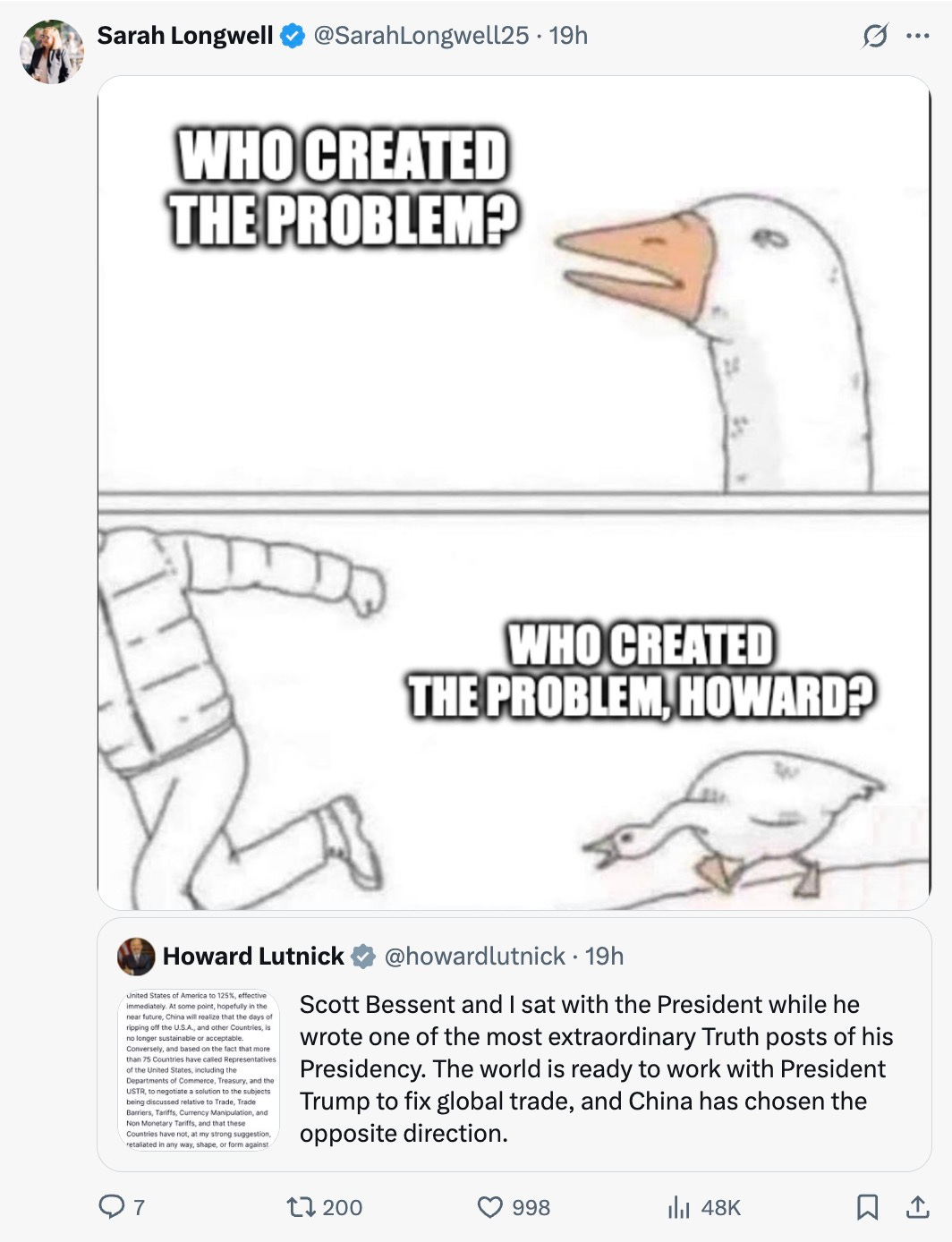
Did Kamala Ever Stand a Chance? Inside the Battle for the White House (with Jonathan Allen & Amie Parnes)
April 10, 2025
Simon Clarke, Theorist of Capitalist Crisis
April 10, 2025“The Golden Age is coming,” Commerce Secretary Howard Lutnick proclaimed this morning. “We are committed to protecting our interests, engaging in global negotiations and exploding our economy.”
We don’t know about you, but we’ve had about enough of these guys exploding our economy. Happy Thursday.
by Andrew Egger
The unstoppable force of crashing markets versus the immovable object of Donald Trump’s belief in the salutary power of tariffs: For days, everyone’s been wondering which would win.
On Wednesday, we got our answer. Trump’s plenty stubborn, but he blinked first.
His out-of-nowhere Truth Social post announcing massive new tariffs on China but a 90-day pause on most tariffs for everyone else (more on this in a bit) sent markets joyously skyrocketing—not because traders were pleased by the economic fundamentals of the announced change, but because they were plainly relieved that Trump was proving willing to respond to economic stimuli at all.
His economic advisers tried hilariously to argue this shift had always been the plan. “He and I had a long talk on Sunday,” said Treasury Secretary Scott Bessent, “and this was his strategy all along.”
But Trump himself didn’t bother to maintain that fiction. He told reporters he’d put the pause in place because people were “getting a little bit yippy, a little bit afraid.” In particular, he cited the alarming investor flight from the U.S. bond market.
Meanwhile, the online MAGA crowd moved as one to tear up their “massive global tariffs are the fearless hero’s path to renewed American manufacturing prosperity” talking points. In their place, they pivoted seamlessly to “massive global tariffs were a diabolical feint to expose China.”
Okay, gang! Glad you’re having fun! To the rest of us, it’s obvious: Political and economic realities can still be devastating enough to push even Trump off his chosen course. This is a tiny calm patch in a raging river of shit. But it’s still a good thing. And it’s something that we’re beginning to see in other arenas too: The administration has dropped a plan to get rid of phone lines at the Social Security Administration amid an outcry from recipients; it’s backed down occasionally in its deportation regime when the public pressure gets too acute.
Still, we shouldn’t oversell the economic relief Trump has offered here. Yesterday’s pause applies only to the extinction-level, nation-by-nation “reciprocal” tariffs announced last week; the new 10-percent global baseline tariff remains in place, as do Trump’s various earlier targeted tariffs. And what we’re talking about is a pause pending bilateral negotiations with more than 75 countries—negotiations in which Trump’s ludicrous aim remains the same flattening of trade deficits with each country that he has demanded all along.
And then there’s the small matter of the increased tariffs on China, which have now grown so towering they essentially amount to a full trade embargo—effective immediately—on the world’s second-largest economy and our third-largest trading partner.
The biggest obstacle to future growth remains trade instability. Not even Trump knows what U.S. trade policy will look like six months from now, let alone 90 days. He’s improvising, ad-libbing, making snap decisions that reform the economic landscape all the time. Even yesterday’s tariff reprieve was totally slapdash and ad-hoc—it took hours after Trump’s announcement for the White House to clarify, for instance, whether “reciprocal” tariffs on Europe were also coming down, or how trade with Mexico and Canada would be impacted.
We “just wrote it up,” Trump said of the policy. “We didn’t have access to lawyers . . . It was written from the heart.”
That was Trump’s heart today. And it’s refreshing to see that it still beats—that he can still look at a worsening bond market and economic calamity and say to himself: Maybe I don’t want that.
But what will it be tomorrow? Can businesses commit to the sorts of expansions and investments that grow the economy, not knowing how soon the rug may be pulled from beneath them again?
by William Kristol
Yesterday’s pause in the tariffs that had been announced with so much fanfare seven days ago was a humiliating reversal and retreat by Donald Trump. Perhaps because the Trump administration so much resembles a preschool full of toddlers, I was reminded of a nursery rhyme:
Oh, the grand old Duke of York,
He had ten thousand men;
He marched them up to the top of the hill,
And he marched them down again.
When they were up, they were up,
And when they were down, they were down,
And when they were only halfway up,
They were neither up nor down.
But unfortunately this fine old English nursery rhyme doesn’t really fit our circumstances.
The grand old Duke of York marched his soldiers up and down the hill pointlessly—but apparently quite harmlessly. American consumers and businesses have not been left unharmed by the actions of the past week. We’ve been left with still damagingly high tariffs, a trade war with China, total uncertainty about the future of international economic policy, and a vivid demonstration of the unseriousness of policy-making in the Trump administration.
All of this ensures further harm to consumer and business confidence at home, and more distrust in the basic soundness of our institutions and policies abroad. And so, equities and bonds may soon be under pressure once again, the real economy will falter, and we’ll be left marching willy-nilly, at best, towards a condition of stagflation and, at worst, towards a major international economic crisis.
Of course we’ll also be left with a president still committed to foolish and dangerous policies, and willful and authoritarian governance. In the case of tariffs, the markets have forced a partial if temporary course correction. But markets by themselves can’t ensure the survival of a rule-of-law polity, a decent society, or a stable global international order.
That is the task of politics.
And politics is an arena of named individuals taking responsibility, not crowds of anonymous traders buying and selling. Members of Congress, justices of the Supreme Court, individuals in positions of authority in the executive branch, managing partners of law firms, presidents of universities, civic and state and local leaders—they need to step up and take responsibility. They can’t hide in the anonymity of the markets.
If actual, real, named people fail to act courageously and responsibly—if they fail to lead—the nursery rhyme that we’ll be recalling won’t be The Grand Old Duke of York. It will be Humpty Dumpty.
Humpty Dumpty sat on a wall.
Humpty Dumpty had a great fall.
All the king’s horses and all the king’s men
Couldn’t put Humpty together again.
We will be Humpty Dumpty.
-
Trump’s ‘Peace’ Effort Is Dead. Putin Killed It… Russian strikes on Ukrainian cities are up more than 50 percent since the Trump talks started, reports CATHY YOUNG.
-
The Big Tariff Lie… Trump’s trade war madness is his election denial madness all over again, argues WILL SALETAN.
-
Trump’s a Dunce. Don’t Blow This, Dems! Join SARAH, JOE PERTICONE, JONATHAN COHN, and MONA CHAREN as they talk about the economic chaos of Tarriffgeddon and the Democrats’ lackluster response to it.
OUT IN THE OPEN: After spending yesterday morning pulling back on tariffs, Trump indulged in a little presidential self-care Wednesday afternoon: airing long-debunked grievances about the 2020 election and signing executive orders commanding criminal investigations into several first-term political enemies. Per Politico:
The directives that Trump signed on Wednesday order the Justice Department to scrutinize Chris Krebs, who ran Trump’s Cybersecurity and Infrastructure Security Agency, and former senior Department of Homeland Security official Miles Taylor. . . .
The order signed by Trump labeled Krebs “a significant bad-faith actor who weaponized and abused his Government authority.” As he signed the order on Wednesday stripping Krebs’ security clearance and opening an investigation into his activities, Trump repeated his false claims that the 2020 election was “rigged.”
“It was proven by so many different ways in so many different forms,” Trump said. “We’re going to find out about this guy too, because this guy is a wise guy.”
Krebs was fired during the first Trump administration for a single reason: He pushed back in public against a number of specific, false claims of election fraud that were buzzing around right-wing circles and were being encouraged by the president himself. For Trump to openly direct the Justice Department to investigate him is naked political retaliation and corruption.
A NEW TYPE OF CAMPUS CULTURE: It hasn’t received much attention amid all the other chaos happening, but the Trump administration has revoked hundreds of international student visas in recent weeks, causing fear and havoc at universities and colleges across the country. One of the latest examples quietly took place this past week at the University of Georgia, where six non-U.S. citizen graduate students, all studying in the STEM disciplines, received notices that their visas were being revoked. According to a source familiar with the situation, more visa terminations are expected. The school did not return a request for comment.
All this stems from a directive by Secretary of State Marco Rubio to, in his words, rid campuses of “lunatics” who have participated in protests that have, in his estimation, damaged their schools, intimidated fellow students and, more generally, not demonstrated alignment with U.S. national interests. It’s been dystopian at times, with footage surfacing of a Tufts student being detained by plain-clothesed immigration officers while walking down the street. But in the weeks since Rubio began this initiative, a pattern has also emerged: blue states are being targeted more regularly than red ones.
Inside Higher Education has been keeping a database of international students who have had their visas revoked. As of Wednesday morning, a total of 419 students in 89 different schools had been impacted. Of those, 66 schools were in states with a Democratic governor (the most being 12 in California, whose state-run university system has been hit particularly hard) as well as Washington D.C. Twenty-three schools were in states with a Republican governor. The data set did not include the case at the University of Georgia.
—Sam Stein
HI HO, HI HO: Of the law firms Trump has targeted for retribution this term, four have signed deals agreeing to change certain practices and promising tens of millions of dollars in pro bono work on topics amenable to the White House. These firms presumably hoped that going belly-up would slake Trump’s thirst for vengeance and let them largely go about their business.
Instead, Trump is already talking about stretching the limits of their agreements, treating the firms essentially as unofficial White House lawyers that he can now deploy at will. This week, Trump talked about putting some of those firms on coal industry cases to help with permitting applications.
Was this idle chatter or an actual policy rollout? Yesterday, we asked each of the firms—Paul Weiss, Skadden Arps, Milbank, and Willkie Farr & Gallagher—whether the White House was asking them to deploy on behalf of the coal industry. None responded. But the White House did: “Big Law continues to bend the knee to President Trump because they know they were wrong, and he looks forward to putting their pro bono legal concessions toward implementing his America First agenda,” press secretary Karoline Leavitt said in a statement to The Bulwark.
HAPPY BIRTHDAY TO ME: New Labor Secretary Lori Chavez-DeRemer appears to have thrown herself a birthday party at department headquarters this week. Pictures of the event were shared with The Bulwark showing a large room with scattered cocktail tables, along with wine and Chavez-DeRemer’s face on multiple TVs.
Not everyone was pleased. Some Labor employees grumbled about the optics of the new boss, who was confirmed last month, throwing herself a cheery party against the backdrop of past and likely future cuts at the department. Somebody taped a meme over a picture of Chavez-DeRemer’s face: the rapper Drake shrinking away from “using taxpayer dollars to end unsafe working conditions” in favor of “using taxpayer dollars to throw yourself a birthday party.”
A few bottles of wine isn’t breaking the federal budget. But it speaks to the resentment simmering between the federal workforce and the political appointees Trump has placed in charge of their agencies. The depredations of DOGE have been a bit out of the news lately—but for these workers, the knowledge that the White House is shaking their agencies around like rag dolls hasn’t gone away. And no amount of birthday cheer will fix it.
Great Job William Kristol & the Team @ The Bulwark Source link for sharing this story.






